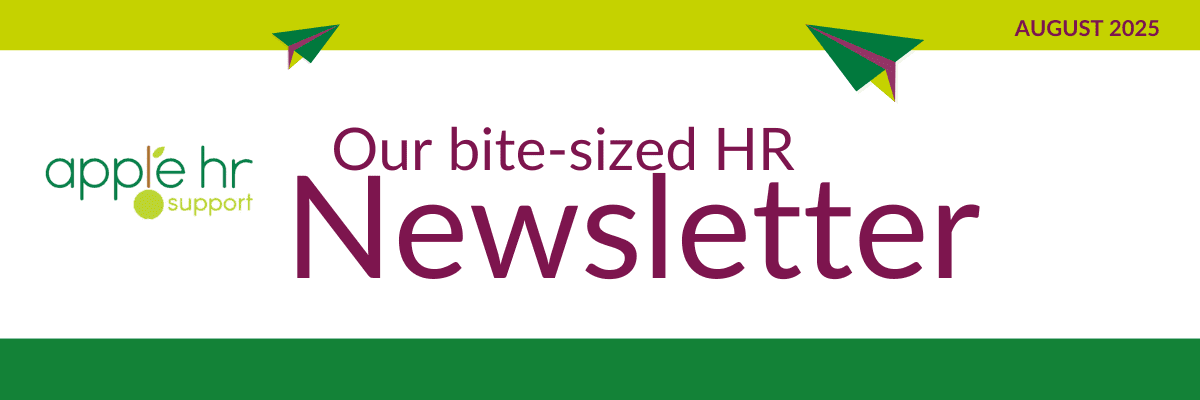
September is a great kickstart month! What are you going to be working on?
There’s something about September. It’s a great kickstart month.
Summer holidays are over, kids are back to school and it’s the final quarter before the end of the year.
So, what’s your focus for the next couple of months?
3 questions to ask yourself now
1. What does your team actually need to focus on between September and Christmas?
2. What will tell you whether you’re making progress?
3. How will you know if this quarter’s been successful?
These are simple questions, but they help you to cut through the noise to focus on what actually matters for your business.
From an HR point of view, here are some things you could work on:
1) Check your contracts, policies and handbook – so you know, once and for all, that you’re not unknowingly breaking the law.
2) Put proper absence processes in place – sickness tends to spike in November. Get ahead now to avoid a productivity crash later.
3) Focus on employee engagement – employees are most likely to hand their notice in post summer and January. Time to keep them engaged now.
Need help with turning your ideas into action?
Get in touch for a confidential chat today.
Are your parental leave policies helping or hurting retention?
It’s official. Women on statutory maternity pay face an average £6,230 shortfall over a year – even when splitting household bills with a partner. This is pushing families into debt or forcing early returns to work.
74% of employees now receive enhanced maternity pay and they’re seeing stronger staff loyalty as a result.
We understand that enhanced pay might not be realistic for every business, but there are other ways to make things easier.
Flexible return arrangements, making good use of keeping in touch days, or even just being understanding about appointments can make a real difference to how supported people feel.
Your managers might be the cause and the cure of team burnout
We came across research the other day that showed that nearly 60% of leaders are absolutely completely worn out by the end of each day, with 65% showing proper burnout symptoms.
When your managers are stressed out and overwhelmed, it becomes a team problem.
Some simple leadership coaching can be the best way to help your managers to get their heads straight and could even encourage teams to stick around longer, perform better and take fewer sick days.
If you’re seeing stress ripple through the business, let us give your managers proper practical help with managing workload and how to communicate better.
Why one ‘quick’ redundancy cost £24k
Recently, a woman was made redundant during a video call on her day off. The employer called it a ‘catch up’ meeting, giving her no warning about what was actually going to happen. Eek.
The tribunal awarded her £24,000, criticising the rushed approach. She was blindsided, given no chance to have support and the employer didn’t consider her mental health needs.
We haven’t included this to scare you, but it is a gentle reminder that cutting corners on process can be expensive. Even when you think you’re being kind by getting difficult news over quickly, proper process always matters more than good intentions.
How to handle impulsive resignations
Someone storms out of a meeting saying “Right, that’s it, I quit”.
Is that legally binding, or can you treat it as a heat-of-the-moment outburst?
The legal position
For a resignation to stick, it needs to be clear, voluntary and genuine. Someone shouting “I’m leaving” during an argument usually doesn’t meet that test.
But verbal resignations can be valid if the person clearly meant it. Context matters more than exact words.
What to do
1. Don’t react immediately. Resist accepting their resignation on the spot.
2. Give them space to cool off. Let emotions settle before doing anything formal.
3. Follow up in writing. Ask them to confirm whether they intended to resign. Keep it factual.
4. Document everything. Save their original words, your response, their reply. You’ll need records if this escalates.
The follow-up conversation
“Yesterday was clearly difficult. Did you mean to resign, or were you just frustrated?”
This gives them a face-saving way to clarify their position and protects you legally if they later claim they never resigned.
Most people will either confirm they meant it or admit they were just venting. Either way, you’ll know where you stand.
Need help with a tricky employment situation? Get in touch for a confidential chat about how we can support your business.
Q&A
Do I need to update contracts every time someone gets a pay rise?
No, but you should always document it. You don’t need to reissue a whole new contract every time someone’s pay changes – that would be a nightmare. A simple variation letter or addendum is perfectly fine.
The key thing is getting it in writing. Even a quick email saying “Following our chat, your salary is increasing to £X from [date]” creates a clear record and protects both of you if there’s confusion later.
Can I legally reduce someone’s hours if business is slow?
Not without their agreement – we know it’s frustrating when business is tight, but you can’t just cut someone’s hours without asking them first. That changes their contract terms and could cause bigger problems down the line.
You might have options though. Some contracts include flexibility clauses, or the employee might be willing to agree to reduced hours temporarily. Either way, it’s worth getting some advice before you make any changes – there are ways to handle this properly that protect everyone.
How do I handle it if two employees are in a relationship?
You don’t need to ban workplace relationships – they happen and people are allowed to have personal lives. The key is managing any potential issues that could affect the business, like reporting lines or concerns about favouritism from other team members.
If one person manages the other, or they’re involved in decisions that could benefit each other, that’s when you need to be more careful. A simple policy about declaring relationships and managing conflicts of interest can help to set clear expectations. What matters most is that everyone stays professional at work and the team feels that things are fair.

